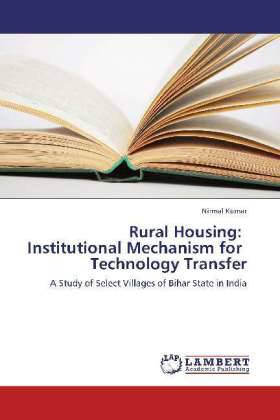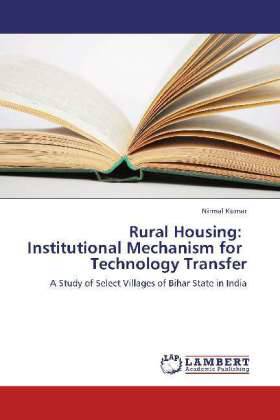
Je cadeautjes zeker op tijd in huis hebben voor de feestdagen? Kom langs in onze winkels en vind het perfecte geschenk!
- Afhalen na 1 uur in een winkel met voorraad
- Gratis thuislevering in België vanaf € 30
- Ruim aanbod met 7 miljoen producten
Je cadeautjes zeker op tijd in huis hebben voor de feestdagen? Kom langs in onze winkels en vind het perfecte geschenk!
- Afhalen na 1 uur in een winkel met voorraad
- Gratis thuislevering in België vanaf € 30
- Ruim aanbod met 7 miljoen producten
Zoeken
Rural Housing: Institutional Mechanism for Technology Transfer
A Study of Select Villages of Bihar State in India
Nirmal Kumar
Paperback | Engels
€ 100,45
+ 200 punten
Omschrijving
This study analyses the problems of rural housing in India. It reveals actual impediments in implementation of government initiatives and the deficiencies there in such as absence of suitable linkages with R&D institutions; lack of competent professionals; lack of technical infrastructure; and extension mechanism. Consequently, there is least percolation of technology at the user end. Further, through an Interpretive Structural Model, the study identifies creation of nodal institutions at the state level to enable acquisition of technology, building of support system and mechanism for extension network; and formulation of a workable action plan for rural housing. In the absence of an effective institutional mechanism no comprehensive Rural Housing and Habitat Policy can be operationalised and technical intervention alone cannot serve the purpose of reducing drudgery and increasing efficiency, productivity, quality and sustainability in the rural housing sector. This volume, thus, acquires importance among professionals and policy makers in India and other developing countries.
Specificaties
Betrokkenen
- Auteur(s):
- Uitgeverij:
Inhoud
- Aantal bladzijden:
- 256
- Taal:
- Engels
Eigenschappen
- Productcode (EAN):
- 9783659182488
- Verschijningsdatum:
- 21/09/2012
- Uitvoering:
- Paperback
- Afmetingen:
- 150 mm x 220 mm
- Gewicht:
- 381 g

Alleen bij Standaard Boekhandel
+ 200 punten op je klantenkaart van Standaard Boekhandel
Beoordelingen
We publiceren alleen reviews die voldoen aan de voorwaarden voor reviews. Bekijk onze voorwaarden voor reviews.









